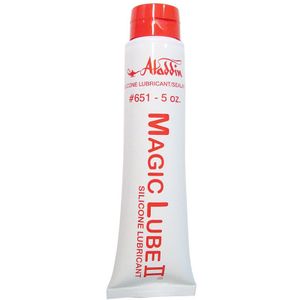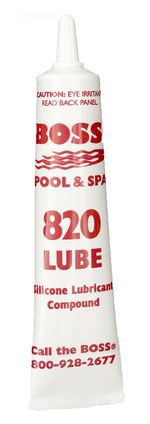(Created page with "=Pool Lube= Pool Lube or O-Ring Lube should be used on gaskets and o-rings in filters, pump basket lids and valves around the pool. MagicLube II (red label with silicone, no...") |
|||
| (16 intermediate revisions by the same user not shown) | |||
| Line 1: | Line 1: | ||
=Pool Lube= | =Pool Lube= | ||
| + | [[File:Pool Lube MagicLube II.jpg|thumb]] | ||
| + | Pool Lube or O-Ring Lube should be used on gaskets and [[O-Rings|o-rings]] in filters, pump basket lids, and valves around the pool. | ||
| − | + | Any rubber gasket you use should always have silicone lube applied unless expressly forbidden by the manufacturer. Rubber gaskets are imperfect, and there will always be a difference in size and shape between the groove they sit in and the gasket's dimensions. Lube is necessary to make up for those imperceptible differences and to create a watertight seal. Lube also adds a layer of material that protects the rubber from damage by water and chemicals. | |
| − | MagicLube II (red label with silicone, not original blue label with | + | MagicLube II (red label with silicone, not the original blue label with Teflon) or Boss 820 are recommended products. Also, [https://www.poolweb.com/products/aqua-shield-grease-5-5-oz-tube Aqua Shield Grease] can be used on bearings, [[O-Rings|o-rings]], and all metals exposed to salt water, fresh water, steam, and pool chemicals. |
| + | |||
| + | You may find [https://www.homedepot.com/p/DANCO-0-5-oz-Silicone-Faucet-Grease-88693/203193536 Danco 0.5 oz. Silicone Faucet Grease] at Home Depot. | ||
| + | |||
| + | There are many other good products sold. It should be a silicone based, non-PTFE lubricant.<ref> https://www.troublefreepool.com/threads/pump-locking-lid-lubrication.194142/post-1711175</ref> PTFE Teflon gums up and gets sticky. | ||
Never use petroleum products, such as Vaseline, on anything rubber. | Never use petroleum products, such as Vaseline, on anything rubber. | ||
| + | [[File:Pool Lube Boss 820.jpg|150px|thumb]] | ||
| + | |||
| + | ==Lubing Pump Lid O-Ring== | ||
| + | *Remove the [[O-Rings|o-ring]] and clean it with a clean rag. | ||
| + | *Use the same rag to clean the channel. It does not need to be spotless to ensure no grime or dirt can cause issues. | ||
| + | *Use a liberal amount of pool lube; use your index finger and thumb to get good lube coverage on the [[O-Rings|o-ring]]. | ||
| + | *Install [[O-Rings|o-ring]] and pump basket. | ||
| + | *Clean lube off hands. | ||
| + | |||
| + | ==Cleaning Lube Off Hands== | ||
| + | *Wear disposable gloves | ||
| + | *Wash your hands with a good grease-cutting dishwashing detergent, like Dawn. Then apply a light hand cream like Gold Bond because Dawn dries the dickens out of your skin. | ||
| + | *A cleaner with d-limonene<ref> https://www.troublefreepool.com/threads/magic-lube-clean-up.191851/post-1690485</ref> | ||
| + | |||
| + | ==Why Do O-Rings Need to be Lubed?== | ||
| + | |||
| + | [[O-Rings|O-Ring]] lube allows the three surfaces involved (the ring and the two components it's sealing together) to slide together as you tighten things up.<ref>https://www.troublefreepool.com/threads/gaskets-and-o-rings-and-lube-oh-my.197543/post-1742845</ref> Without it, the ring will pinch and bind and deform. It's the deformation that causes the leaks. And the premature wear. So, the lube does not add to the sealing properties of the ring; instead, it allows the ring to retain its correct shape and do its job. In that way, it can lengthen the ring's life. Cleaning the ring and the surfaces it touches is important because a chunk of dirt can deform the ring and cause a leak. | ||
| + | |||
| + | ==How Much Should a Fitting With an O-Ring be Tightened?== | ||
| + | |||
| + | It's important not to over-tighten an [[O-Rings|o-ring]]. Doing so can cause it to leak, which can also deform the ring. Generally, fittings with [[O-Rings|o-ring]] only need to be "hand tight." You might need a wrench to loosen such a fitting, but you shouldn't use a wrench to put it back together if you can avoid it. If your hands are not strong enough to tighten a fitting enough, you can gently use a wrench, but only to make the fitting more snug than you could with your hands. You don't crank the fitting down. | ||
| + | |||
| + | ==Tips== | ||
| + | *Never pull the [[O-Rings|O-Ring]] through your fingers. Always push it through your fingers. Pulling stretches the [[O-Rings|O-Ring]] and it ends up being too big | ||
| + | |||
| + | . | ||
Latest revision as of 21:07, 21 November 2024
Pool Lube
Pool Lube or O-Ring Lube should be used on gaskets and o-rings in filters, pump basket lids, and valves around the pool.
Any rubber gasket you use should always have silicone lube applied unless expressly forbidden by the manufacturer. Rubber gaskets are imperfect, and there will always be a difference in size and shape between the groove they sit in and the gasket's dimensions. Lube is necessary to make up for those imperceptible differences and to create a watertight seal. Lube also adds a layer of material that protects the rubber from damage by water and chemicals.
MagicLube II (red label with silicone, not the original blue label with Teflon) or Boss 820 are recommended products. Also, Aqua Shield Grease can be used on bearings, o-rings, and all metals exposed to salt water, fresh water, steam, and pool chemicals.
You may find Danco 0.5 oz. Silicone Faucet Grease at Home Depot.
There are many other good products sold. It should be a silicone based, non-PTFE lubricant.[1] PTFE Teflon gums up and gets sticky.
Never use petroleum products, such as Vaseline, on anything rubber.
Lubing Pump Lid O-Ring
- Remove the o-ring and clean it with a clean rag.
- Use the same rag to clean the channel. It does not need to be spotless to ensure no grime or dirt can cause issues.
- Use a liberal amount of pool lube; use your index finger and thumb to get good lube coverage on the o-ring.
- Install o-ring and pump basket.
- Clean lube off hands.
Cleaning Lube Off Hands
- Wear disposable gloves
- Wash your hands with a good grease-cutting dishwashing detergent, like Dawn. Then apply a light hand cream like Gold Bond because Dawn dries the dickens out of your skin.
- A cleaner with d-limonene[2]
Why Do O-Rings Need to be Lubed?
O-Ring lube allows the three surfaces involved (the ring and the two components it's sealing together) to slide together as you tighten things up.[3] Without it, the ring will pinch and bind and deform. It's the deformation that causes the leaks. And the premature wear. So, the lube does not add to the sealing properties of the ring; instead, it allows the ring to retain its correct shape and do its job. In that way, it can lengthen the ring's life. Cleaning the ring and the surfaces it touches is important because a chunk of dirt can deform the ring and cause a leak.
How Much Should a Fitting With an O-Ring be Tightened?
It's important not to over-tighten an o-ring. Doing so can cause it to leak, which can also deform the ring. Generally, fittings with o-ring only need to be "hand tight." You might need a wrench to loosen such a fitting, but you shouldn't use a wrench to put it back together if you can avoid it. If your hands are not strong enough to tighten a fitting enough, you can gently use a wrench, but only to make the fitting more snug than you could with your hands. You don't crank the fitting down.
Tips
- Never pull the O-Ring through your fingers. Always push it through your fingers. Pulling stretches the O-Ring and it ends up being too big
.



